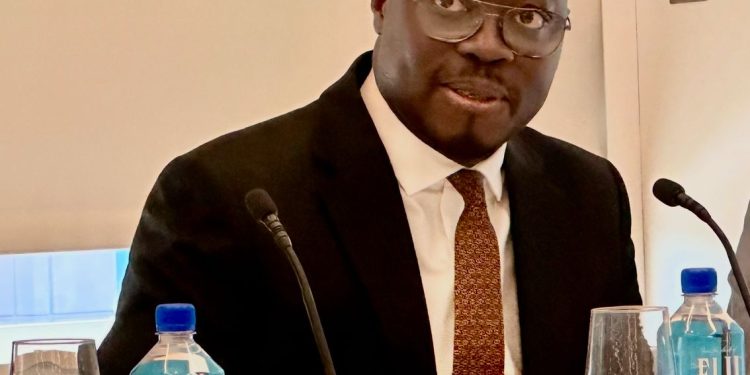Investor Confidence in Ghana’s Economic Reforms Soars Amid Washington Engagement
Ghana’s economic management is regaining global investor confidence, following a high-level dialogue in Washington, D.C., led by the country’s Finance Minister, Dr Cassiel Ato Forson. The engagement, held on the sidelines of the IMF-World Bank Spring Meetings, signalled strong endorsement for the government’s ongoing fiscal reforms and macroeconomic stabilisation agenda.
In his address to investors, Dr. Forson presented a cautiously optimistic outlook, noting that the Ghanaian cedi had not only stabilised in recent months but was now recording gains against major trading currencies. “Our reserve position is solid, covering over four months of imports, a clear demonstration of our strengthened external buffers,” he remarked.
The event, which brought together a mix of multilateral institutions, private equity firms, and sovereign investors, marked a turning point in Ghana’s economic narrative since securing a staff-level agreement for the fourth review of the IMF-supported program.
The delegation included the Governor of the Bank of Ghana, Dr. Johnson Pandit Asiama, and Mr. Seth Terkper, Presidential Advisor on the Economy. Together, they presented a unified front on Ghana’s efforts to reset its economy and restore market confidence following years of macroeconomic challenges and sovereign debt restructuring.
Highlighting domestic fiscal performance, the Finance Minister reported that the Ghana Revenue Authority exceeded its Q1 revenue target by over GHS 2.4 billion, buoyed by robust VAT collections and improvements in key tax categories. On the expenditure side, the government has largely held non-capital spending at 2023 levels, underscoring its commitment to fiscal discipline.
“These twin pillars of revenue outperformance and restrained expenditure are what will anchor our projected 1.5 percent primary surplus in 2025,” Dr Forson explained. “We are not merely stabilising; we are resetting for sustained growth.”
Dr Forson also assured investors that the Bank of Ghana’s strong reserve position guarantees the prompt servicing of external debt obligations. “Timely coupon and interest payments are a non-negotiable pillar of our financial integrity,” he stated, reinforcing investor confidence in Ghana’s debt sustainability trajectory.
The Central Bank’s ongoing monetary tightening and forex market interventions have also been credited with helping ease inflationary pressures, further contributing to cedi stability.
Looking ahead, the Finance Minister disclosed that the government will unveil its updated comprehensive debt management strategy during the Mid-Year Budget Review. The strategy, he said, will prioritise sustainable borrowing, promote investor trust, and maintain macro-fiscal balance.
“We are not chasing short-term optics,” he said. “Our goal is to entrench credibility, unlock concessional financing, and deepen access to long-term capital.”
Governor Asiama highlighted the central bank’s inflation-targeting policy and monetary tightening stance, which have contributed to currency stability and improving reserve buffers. He reaffirmed the Bank of Ghana’s resolve to maintain price stability while supporting financial system resilience and growth.
The presentation showcased Ghana’s macroeconomic progress, including a rebound in GDP growth to 5.7% in 2024, declining inflation, and a debt-to-GDP ratio on track to fall below 55% by end-2025. The team also spotlighted key structural reforms, such as the operationalization of the single treasury account for the energy sector and amendments to the PFM and Procurement Acts to curb arrears and inefficiencies.
Investors were updated on the status of Ghana’s debt restructuring, with over 93% of eligible public debt already restructured. This milestone, the delegation noted, positions Ghana for positive credit rating reviews and eventual reentry into the international capital markets.
Mr. Terkper underscored the importance of credibility and transparency in rebuilding trust with the investor community. “Our actions are deliberate and structured to align with long-term economic transformation. Ghana is open for business,” he said.
The investor dialogue provided an opportunity for Ghana to reinforce its reform agenda and assure creditors of its commitment to sustained macroeconomic stability and growth.
Market Reaction and Broader Implications
The investor roundtable reflected a growing belief that Ghana, once among the most fiscally distressed countries in sub-Saharan Africa, is charting a pragmatic recovery path. Analysts present praised the government’s improved transparency and clear communication around fiscal targets and reforms.
The renewed confidence follows Ghana’s difficult yet decisive measures under its $3 billion IMF Extended Credit Facility programme, which includes structural reforms, public financial management enhancements, and energy sector rationalisation.
As the country prepares to re-enter international capital markets, this week’s engagement sends a clear signal: Ghana is not only stabilising; it is preparing to compete.








